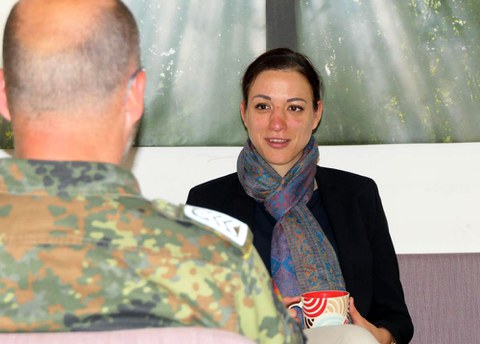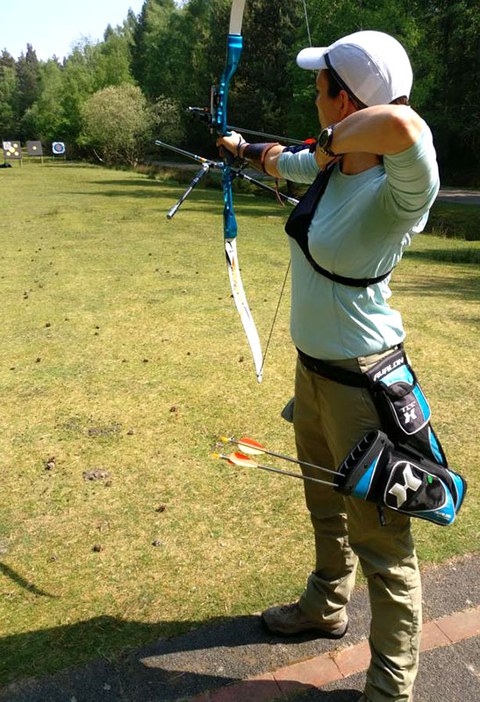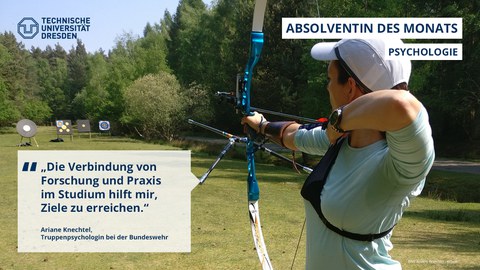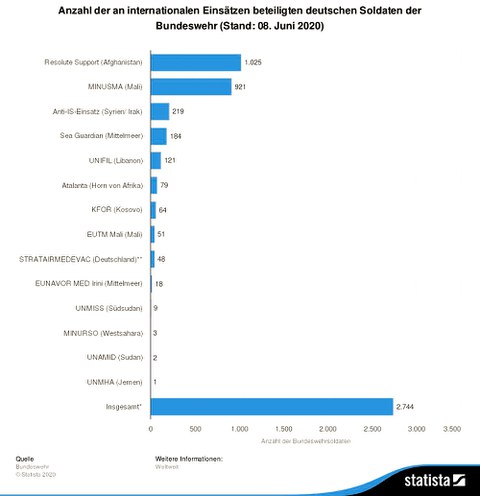Life is reflected in the troops
(Interview from 2020)
Dagmar Möbius
"That child is going to university." Ariane Knechtel's family had no doubt from the time she attended elementary school in Eisenhüttenstadt. But what would she study? In 9th grade, she read a report about a police psychologist – and the seeds were sown. She now works as a psychologist with the Bundeswehr, the German armed forces, and feels her degree laid an excellent foundation for her current role. Small wonder that she still has close ties to her former university and recently showed her gratitude with a donation for students in need.
"Friends at school always said I was so good at listening to problems," the psychology graduate explains to us over Skype. "That's true of 90 percent of all psychologists," she laughs. After reading an intriguing report about a police psychologist, she completed an internship with a psychological psychotherapist before graduating high school. "I found it fascinating to see what phenomena from everyday life could be explained in psychological terms." Her professional goal was clear. Clear-cut and compelling is how her current employer would describe her résumé a few years later, "even if luck did play a role at some points."
Ariane Knechtel studied psychology at TU Dresden from October 2008 to May 2014. Born in nearby Brandenburg, she was familiar with Dresden and the university thanks to her father, who worked at the Faculty of Chemistry and Food Chemistry. The fact that, for years, the psychology program had hovered around the top of the CHE University Ranking only strengthened her decision. However, the sought-after acceptance for the subject with restricted admission (numerus clausus) was one of the last responses she received out of all of her applications to multiple universities.
"It was an amazing education, in particular in terms of the link between research and practice," she says looking back, praising the program – even if four years of statistics modules and research methods have stuck in her mind as pretty dry compared to the other subjects. "I was interested in many things in the field, and chose to specialize in clinical psychology as well as work and organizational psychology." She interned with the riot police in Lahr, and at the addiction department at AHG Klinik Schweriner See clinic. "However, it was clear to me relatively early on that I didn't want to become a psychotherapist, but instead would rather work preventively and holistically." She worked as a student assistant at the Chair of Developmental Psychology and the Chair of Psychology of Learning and Instruction, and as a tutor for students studying to become teachers. Under Professor Hermann Körndle, Ariane Knechtel wrote her final-year dissertation on learning problem-solving strategies through interactive assignments. "He put a lot of trust in us and appreciated it when we contributed our own ideas. For the lecturers, too, the students were people in whom they were genuinely interested."

Armed forces psychologist Ariane Knechtel
The Chair of Clinical Psychology ran a research project in partnership with the German Bundeswehr while Ariane Knechtel was at TUD. "The project focused on the mental health of soldiers in relation to foreign missions, and it was the first time I had heard about psychologists for the armed forces," she says. However, she did not learn anything about the exact field of work. At the time, she also had no idea that the Bundeswehr, with 280 posts (as of November 2019), is one of the largest employers of psychologists in Germany.
When she realized that there was very little chance of being hired by the police service, she sent an unsolicited application to the Bundeswehr. And was invited to interview. "Nienburg, where's that?" was her first thought. The forces psychologist has now been working at the Multinational CIMIC Command there since 2015. "Ah, everything will be fine now," her supervisor joked when she first arrived. Why? René Klein had also studied psychology at TUD ten years before her, and knew he was welcoming a well-trained professional.

Ariane Knechtel practicing archery
Following a number of courses and basic training adapted for the Bundeswehr's civilian personnel, Ariane Knechtel has the status of civilian "Beamte" – or public servant – with the Bundeswehr. She only wears uniform during foreign missions, or in Germany during military training. There is no such thing as a typical working day. "And that meets my need for a varied working routine," she smiles, comparing the situation to "that of a general practitioner – they require knowledge and also methodological skills in all areas of medicine, but are not specialists in any one field. For more serious health problems, they put you in touch with specialists. And it is the same with forces psychologists." She advises soldiers and their families on stress management and relationship problems. She teaches, and she is present at various meetings. Her role covers a broad spectrum, ranging from psychological crisis intervention in collaboration with specially trained soldiers to surveys for improving job satisfaction, office work and organizational tasks. Not to mention physical training. Physical fitness is a must – which is no problem for Ariane Knechtel. She has been doing taekwondo since she was a teenager. As a different outlet, she also practices archery and yoga. She rides her bike to work and it serves as her general mode of transportation as well. She also swims, runs, and plays ball sports. "I'm generally decent at popular sports with the exception of winter sports," she says.
Ariane Knechtel has so far been deployed abroad twice as part of international Bundeswehr missions: to Kosovo (KFOR) in 2017 and Mali (MINUSMA) in 2019, in each case for four months. Unlike in Germany, on foreign missions she wears uniform, and holds the rank of major. Her tasks on those missions differ little from those in Germany. "It’s like a mirror of ordinary life: conflicts with comrades or superiors, relationship problems, daily briefings with operational command, training on how to deal with stress." Still, she did feel uneasy at times: "There are not only skirmishes and booby traps, but also poisonous snakes and scorpions; the weather, like the temperatures of 40 to 50 degrees Celsius [approx. 100 to 120 degrees Fahrenheit] we experienced in Mali, takes some getting used to." And unlike in Germany, she carried a weapon the whole time. "A basic level of caution is sensible," she says, "but humans are not made for intense and constant fear. It's remarkable what you can learn to endure with time."
Overall, she considers the foreign missions an enriching experience, and one that has also helped the unit to accept her. Only about four percent of German forces deployed to Mali are women. In Germany, twelve percent of soldiers and 38 percent of civilian employees are women.
Humans are not made for intense and constant fear. It's remarkable what you can learn to endure with time. (Ariane Knechtel)
To Ariane Knechtel, COVID restrictions are no reason to complain. "You just have to look at life in the countries where the Bundeswehr is deployed. In almost all cases, the situation is worse than in Germany – in education, healthcare, and infrastructure. Yet dissatisfaction amongst the locals is not much worse than here." Freedom is limited on foreign missions. "You can't go wherever you want; there are no bars; leisure activities are almost impossible." There is always a hustle and bustle in camp. "You share a bathroom, and there are two or three of you to a room." For a woman who as yet has no family ties, foreign deployment brought fewer complications than for comrades with children. Back in Germany, she remarked "just how quiet the quiet is" and "how good we have it at home."
She expressed this gratitude in practical terms by donating to the coronavirus emergency relief fund for TUD students. And she doesn't want to dwell on that. Now in her early 30s, she has lifetime tenure as a public servant, and was promoted a while ago. "I have been fortunate in life so far, and I want to give something back," she says. If the donation helps a prospective psychologist to graduate as they have planned, so much the better.
There are two areas where the armed forces psychologist would like to see change. "In recent years, the Bundeswehr has significantly improved in terms of care for soldiers suffering from PTSD. However, post-traumatic stress disorders are not the only problems soldiers face. They can also suffer from anxiety and depression, for example. It would be good if public perception and the discussion about those issues were more in tune with that." And on a general note: "Thanks to our living conditions, we in Germany can count ourselves among the happiest people in the world. It's a shame when we only focus on the few negative aspects and completely lose sight of the many advantages we enjoy."
Contact:
Ariane Knechtel
Email


